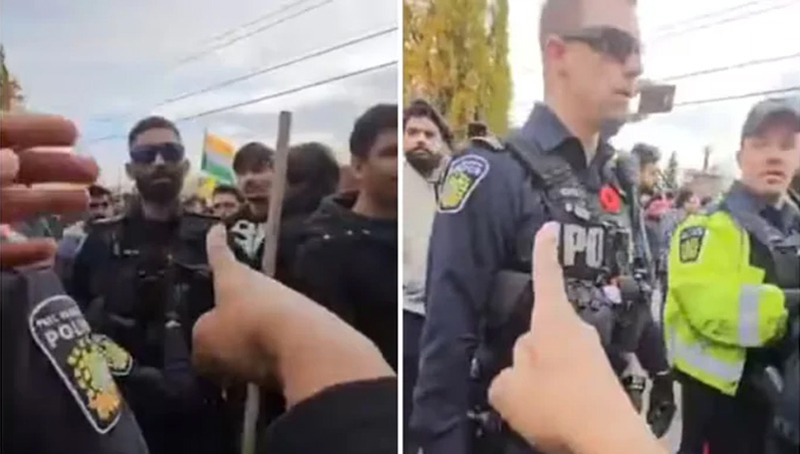 Brampton
Brampton
Canada’s Selective Policing: A disturbing reality amid growing tensions
In recent weeks, the deeply unsettling images of violence at a Hindu temple in Brampton have shaken the global Indian diaspora and underscored a simmering tension in Canada.
The incident reveals a troubling trend that raises three crucial questions: Why did the police, on Trudeau’s watch, target temple-goers rather than the alleged instigators of this violence—the Khalistani extremists? Why does Canada selectively champion free speech when it comes to the Khalistani cause but not for other movements, like the Palestinian protests?
And finally, why is there a conspicuous silence from Canadian politicians, who decry the violence but refuse to name the Khalistani extremists involved?
The visuals emerging from the Brampton temple attack paint a deeply disturbing picture.
Law enforcement, tasked with maintaining peace, appears to be singling out temple-goers while Khalistani extremists remain untouched.
A video shared by journalist Daniel Bordman captures scenes of Peel Police officers not only intervening in the conflict but visibly using force against temple-goers, including elderly individuals.
In one clip, an officer is seen charging at a temple-goer with a punch, sparking a chain reaction that led to more police involvement—and shockingly, no visible restraint directed toward the Khalistani extremists.
Why this selective targeting? The Khalistani lobby has emerged as a vocal constituency in Canada, particularly in provinces with substantial immigrant populations.
Trudeau’s Liberal government, in its attempt to consolidate support among various ethnic groups, has often refrained from taking a firm stance against Khalistani separatist rhetoric.
Many believe this permissiveness is a calculated political move to secure votes, even if it means allowing the perpetuation of an aggressive separatist agenda.
Consequently, the police response at Brampton appears less about peacekeeping and more about a politically calculated choice to avoid offending Khalistani extremists while managing optics around Canada’s relationship with India’s diaspora.
In recent times, Canada has shown itself willing to suppress expressions of dissent, most notably when it comes to protests about the Israeli-Palestinian conflict.
Palestinian rights advocates and their supporters have repeatedly faced restrictions, with events canceled and protests limited under the guise of “maintaining public order.”
This is in stark contrast to the freedom afforded to Khalistani protesters, who have organized violent demonstrations, most involving incitement against India, with no pushback from authorities.
If Canada stands for free speech and peaceful protest, then why are the rules applied inconsistently?
The selective toleration of pro-Khalistani demonstrations over Palestinian ones raises questions about Canada’s motives.
It’s hard to ignore that Trudeau’s selective stance might reflect deeper political calculations and a willingness to condone the Khalistani agenda due to the electoral significance of this demographic.
This selective treatment not only undermines Canada’s claim as a champion of democratic expression but also threatens to create a divided, polarized society where favoritism drives policy.
The violence at the Brampton temple has been widely condemned by Canadian politicians. Yet, what’s glaringly absent is a direct acknowledgment of the perpetrators—those very Khalistani extremists whose flags are prominent in the videos circulating online. There is a conspicuous refusal among Canadian leaders to name the specific groups responsible for inciting hatred and violence. In their vague condemnations, politicians seem to be taking a “no-naming” stance, carefully avoiding any reference to the Khalistani agenda.
Why this hesitancy? Politicians’ reluctance to condemn Khalistani extremists by name could be part of a broader Western agenda. Speculation is growing that Canada’s tolerance of anti-India elements serves a larger strategic aim, leveraging these groups as geopolitical tools to apply pressure on India. The West’s approach to India, a rapidly rising global power, has always been complex, balancing economic cooperation with strategic caution. Some analysts argue that by supporting or at least not suppressing Khalistani factions, Canada and its allies can influence India’s policies and curb its growing influence without direct confrontation.
The recent events at the Brampton temple underscore an alarming trend in Canadian politics: selective policing, double standards in free speech, and a disturbing silence from politicians. The Trudeau administration’s apparent willingness to overlook violent extremism when it benefits their political base is setting a dangerous precedent. If Canada continues to foster divisions within its own society and leverage these against India, the repercussions could be far-reaching, not only for Indo-Canadian relations but also for Canada’s internal harmony and global standing.
Canada must now ask itself whether political gain is worth the price of abandoning its commitment to justice and equality. Only when it ceases to pander selectively will Canada truly live up to its values as a just and democratic society.
(Image and text courtesy: Khalsavox.com)
Support Our Journalism
We cannot do without you.. your contribution supports unbiased journalism
IBNS is not driven by any ism- not wokeism, not racism, not skewed secularism, not hyper right-wing or left liberal ideals, nor by any hardline religious beliefs or hyper nationalism. We want to serve you good old objective news, as they are. We do not judge or preach. We let people decide for themselves. We only try to present factual and well-sourced news.






